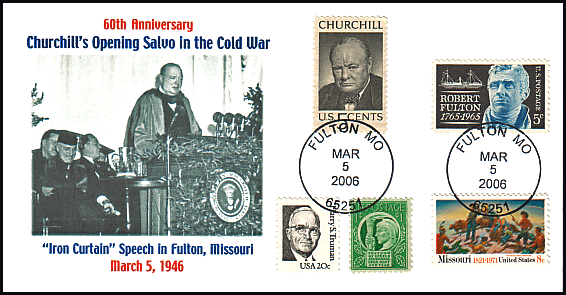
This cover marks the 60th anniversary of Churchill's speech, with Fulton, Missouri postmarks of March 5, 2006.

|
At the urging of President Harry Truman,
Winston Churchill accepted an invitation to speak at Missouri's
Westminster College on March 5, 1946. As he did in the years leading up
to World War II, Churchill once again spoke of dangers ahead: "A shadow
has fallen upon the scenes so lately lighted by the Allied victory.
Nobody knows what Soviet Russia and its Communist international
organisation intends to do in the immediate future, or what are the
limits, if any, to their expansive and proselytising tendencies." Then
Churchill succinctly stated the European situation: "From Stettin in
the Baltic to
Trieste in the Adriatic, an iron curtain has descended across the
Continent." Thus Churchill gave the world a stark image of the battle
line in what soon became known as the Cold War. This cover marks the 60th anniversary of Churchill's speech, with Fulton, Missouri postmarks of March 5, 2006. |
| This
cover's cachet features artwork for Westminster College's
anniversary celebration. The stamps on this and the above cover all
relate to the event: the 1965 Churchill Memorial stamp, a Harry Truman
stamp issued in his 1984 centennial year, a 1943 Four Freedoms stamp, a
1965 stamp honoring steamboat pioneer Robert Fulton (for whom the
Missouri town is named), and a 1971 Missouri Statehood stamp.
|
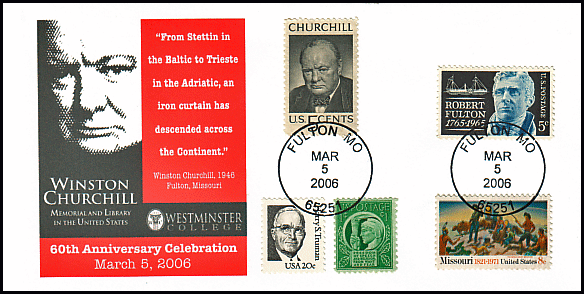
|
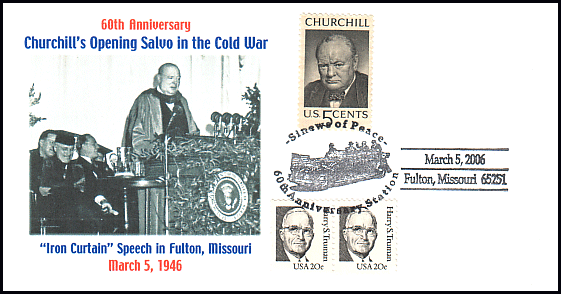
|
This cover features a Fulton pictorial
postmark for the 60th anniversary, depicting Truman
and Churchill riding in an open car through the town. |
| American
diplomat Charles Eustis Bohlen (1904-1974) witnessed history being made
at many of the most important summit conferences of World War II. He
served as interpreter for President Franklin D. Roosevelt in 1943 at
the Teheran Conference, where Roosevelt, Stalin, and Churchill planned
the final phase of the war against Nazi Germany, and again as both
interpreter and adviser in 1945 at the Yalta
Conference. Later
in 1945, he also served as interpreter at the Potsdam Conference, where
Stalin, Churchill, and President Truman discussed the future of Europe
and cooperation in the Pacific. This first day cover of the Bohlen stamp (one of six issued to honor distinguished diplomats) features Roosevelt, Churchill and Truman stamps. The new stamp was issued at the Washington 2006 World Philatelic Exhibition on May 30, 2006. |
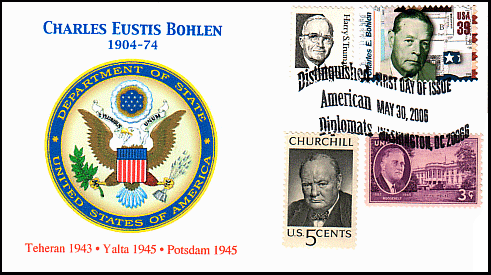
|
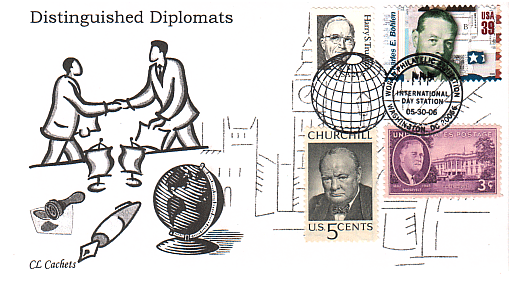
|
Another
Bohlen FDC I serviced at the Washington 2006 show, with the show's
International Day Station postmark. This cachet is by American First Day Cover Society
President Chris Lazaroff. |
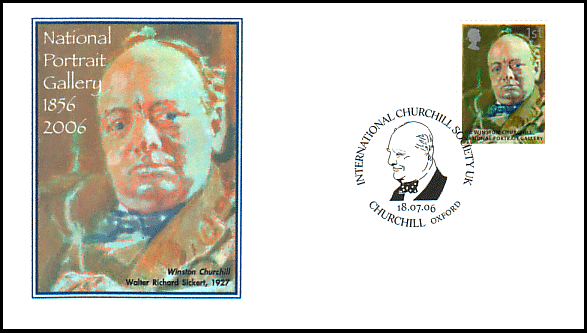 |
Britain's National Portrait
Gallery celebrated its 150th anniversary in
2006 and Royal Mail marked the occasion with a set of ten stamps. First
stamp in the set was painter Walter Richard Sickert's 1927 portrait of
Churchill, which was done at Churchill's home Chartwell while Sickert
instructed fellow
painter Churchill
in technique. Churchill, however, disliked the portrait and gave it
away soon after it
had been presented to him. This Churchill stamp, the first from Britain in 32 years, has a Churchill, Oxford postmark sponsored by the International Churchill Society UK, which is affiliated with the U.S.-based Churchill Centre. |
| Here's
a cover that was 41 years in the making. The new Churchill
stamp added to this 1965 first day cover of the 4d Churchill
memorial stamp also received the 2006 Churchill, Oxford first day
postmark, creating what British collectors call a "doubled" FDC.
|
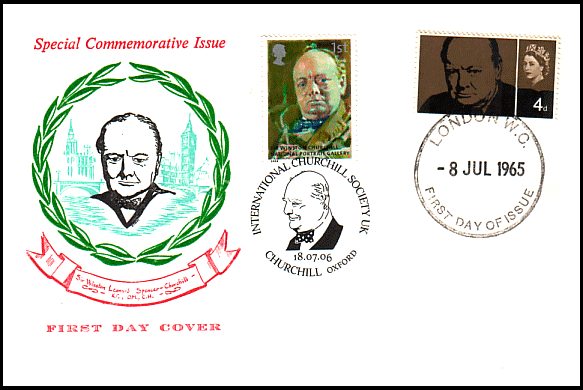 |
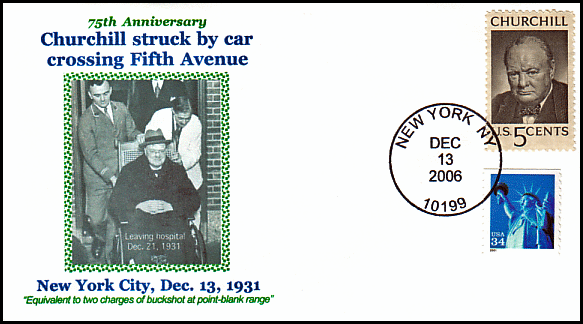
|
Churchill's fourth journey to the United
States in 1931 was intended to be a chance to visit some old friends
and make some money lecturing to American audiences. Instead, the visit
nearly became fatal when Churchill, forgetting the direction traffic
flowed on American streets, stepped into Fifth Avenue on the evening of
December 13. Too late he realized his mistake. Churchill
later wrote, "There was one moment--I cannot measure it in time--of a world aglare,
of a man aghast. I certainly thought quickly enough to achieve the idea
'I am going to be
run down and probably killed.' Then came the blow."
Fortunately for history, Churchill's injuries, while painful and
requiring an extended convalescence, did not threaten his life. "I do
not understand," Churchill wrote, "why I was not broken like an
eggshell or squashed like a gooseberry . . . I certainly must be very
tough or very lucky, or both." This cover marks the 75th anniversary of Churchill's unfortunate accident, which he called "My New York Misadventure." |
